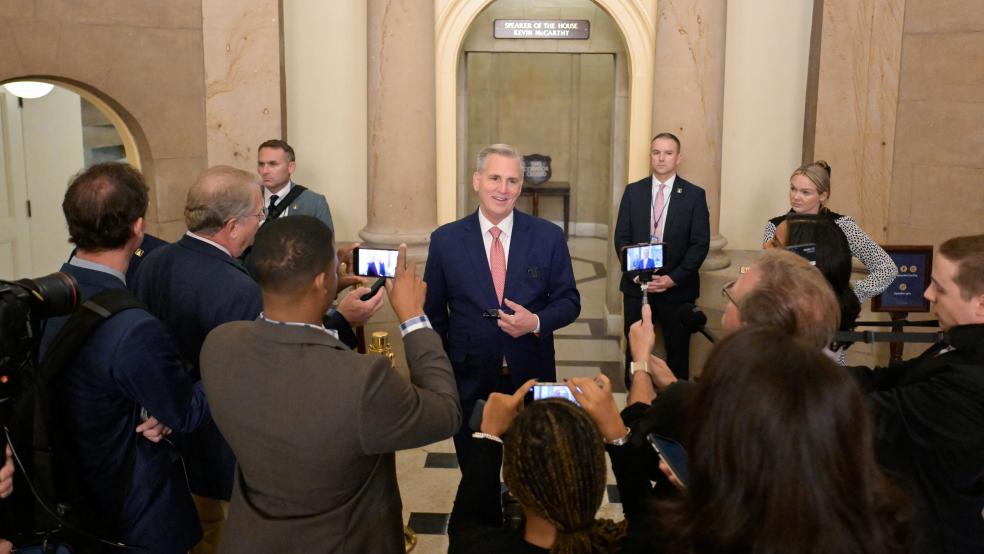We’re just two days away from a likely government shutdown that would leave millions of federal employees, including military service members, without paychecks.
As the hours tick away, congressional lawmakers still have no clear path to averting the looming pain and disruption, though both the Senate and the House are working on stopgap measures to fund the government.
At the moment, there’s no indication that either bill can pass the other chamber, but lawmakers are reportedly working to add border security measures to the short-term funding bill, known as a continuing resolution, in an attempt to win over some House Republican holdouts.
House Speaker Kevin McCarthy, in search of a way out of the bind he and his party’s hard-right members have created, has tried to drag President Joe Biden into the standoff and wring some sort of policy concession or political victory out of the current spending fight by turning it into a battle over border security.
“By floating a stopgap funding bill that would slash spending while imposing stringent immigration restrictions demanded by conservatives, Mr. McCarthy is attempting to shift the debate from an issue that has divided members of his party toward one where they are united — and where they believe Mr. Biden and his party are vulnerable,” Catie Edmondson, Carl Hulse and Karoun Demirjian of The New York Times report.
To some extent, McCarthy’s play has worked, tapping into existing bipartisan concerns: “Some lawmakers now say it is likely that any deal to end what appears to be an inevitable shutdown on Saturday at midnight will eventually have to include some money or policy provisions to address the border,” the Times report notes.
Republican Sen. Thom Tillis of North Carolina and independent Sen. Kyrsten Sinema of Arizona are reportedly heading up an effort to negotiate an immigration deal and add border provisions to the bipartisan short-term spending plan that already includes about $6 billion each for Ukraine aid and disaster relief. The discussions reportedly involve adding another $6 billion for border security and changes to eligibility for migrants seeking asylum.
Even as those talks continue, though, the reality is that the House GOP’s border policies can’t get though the Senate and Republican hardliners’ immigration and border demands are unlikely to be satisfied by any potential bipartisan compromise. And that’s far from the only challenge. “Beyond any border measures, any funding bill that passes the Senate would adhere to the spending levels agreed to by President Biden and congressional Republicans when they brokered the debt ceiling deal — levels that Mr. McCarthy and House Republicans have since reneged on and sought to cut even further,” the Times reports.
McCarthy, meanwhile, reportedly still lacks the votes for his own continuing resolution — and he may not be able to get them given all the outstanding issues and the simple fact that some of his members oppose the very idea of a stopgap bill.
As the deadline draws near, tensions among Republicans continue to run high. McCarthy and Rep. Matt Gaetz of Florida had a testy exchange at a closed-door meeting of the House GOP conference Thursday and Rep. Eli Crane of Arizona indicated to CNN that he would support ousting the speaker. “Quite frankly, I don’t believe, based on what I’ve seen, that there was any effort to do the appropriations process,” Crane told CNN, adding, “I think members should be looking for stronger leadership.”
Other House Republicans have also criticized the House appropriations process as a failure of leadership.
What’s next: The House is expected to try to pass a few more of its annual appropriations bills — funding the Departments of Homeland Security, Defense and State — but ongoing divisions threaten to derail the Agriculture bill. The House Rules Committee on Wednesday night cut $300 million in Ukraine aid from the Defense bill in order to smooth its passage. The House today advanced separate legislation to provide that funding.
The Senate is moving ahead with its continuing resolution, which could still be amended. McCarthy has indicated he would not bring that bill up for a vote in the House as it currently stands and he has said he instead plans on putting the House GOP bill to a vote on Friday. That bill includes the House Republican border plan and steep cuts to non-discretionary spending except for Defense and Veterans Affairs.
The bottom line: A shutdown is probably still in the offing and any path out of it will have to be bipartisan, meaning that we’re probably a long way from a resolution.





